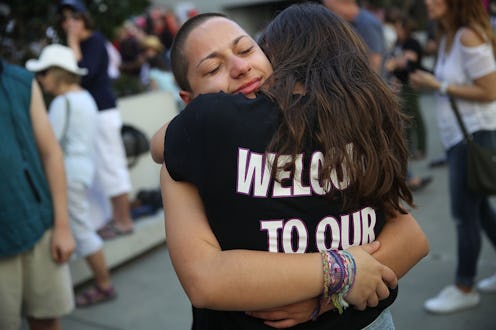News
Emma Gonzalez Has 8 Questions For People Who Think Arming Teachers Is A Good Idea

Marjory Stoneman Douglas High School senior Emma González is pushing back against the idea that putting guns in classrooms will help curb school shootings like the one that left 17 people dead in her town. In a new op-ed for Teen Vogue, González has questions for people who think arming teachers will make students safe from mass school shootings (President Trump, she's looking at you).
In the weeks that followed the deadly school shooting in Parkland, Florida, 18-year-old González has become a figurehead for the youth-led gun control movement that has picked up steam over the last month. Along with speaking out against gun violence and advocating for more comprehensive gun control policies, González has squared off against the National Rifle Association (NRA) and the lawmakers who support it. Through the #NeverAgain movement, she's helped coordinate nationwide school walkouts and the upcoming March For Our Lives rally in Washington, D.C.
This month, González was featured on a new Teen Vogue digital cover dedicated to the "rising voices in the gun control movement." In an op-ed accompanying the cover, she lays out why she and students around the country are fighting for gun control and pushes back against President Trump's suggestion that arming teachers could curb school shootings.
"Many are suggesting that a possible solution to increasing school safety would be arming teachers," González wrote for Teen Vogue. "This doesn’t make any rational or logical sense. For those who don't agree, I have questions."
President Trump brought up the NRA-backed idea of arming teachers shortly after the Parkland school shooting. "If you had a teacher who was adept with the firearm, they could end the attack very quickly," Trump said in February during a White House listening session with those impacted by school shootings. The president went on to suggest that it was school's status as a gun-free zone that fueled "maniacs" to "attack." He suggested schools arm up to 20 percent of their teachers via concealed carry.
But as González points out, there are some complicated questions that come along with the idea of arming teachers. "How would arming teachers work, logistically?" González wrote. "Would they have to buy their own guns, or would there be armories in schools?" If campus armories do become a thing, González raises another chilling thought: "Would students be able to break into armories?"
González also wondered what a teacher would do with their firearm while teaching, a profession that is often very hands on and requires near constant close-contact with students. "While teaching, would a teacher keep their weapon on their person or in a lockbox?" González wrote.
If, in an effort to minimize students' contact with teachers' firearms, the gun was kept locked up, would it be useful in a live shooter situation? "If it was in a lockbox on the other side of the room when a threatening person walked in, would the teacher be able to get to their gun in time?" González pondered.
Trump has argued that school shooters would be less inclined to bring a firearm on campus if they knew teachers also had guns. But, as González notes, what about the potential for teachers' guns to be used against them and the students they're trying to protect? Would armed teachers inadvertently give students who might not otherwise have access to guns, access to a firearm?
"If the threat and the teacher were in close proximity, would the threat not be able to disarm the teacher and turn the pistol on them and in turn the students?" González wrote. "Why would a student shooter even need to worry about metal detectors or getting patted down if they already know they can overpower the teacher and take that gun for their own use?"
González also ponders how those who support arming teachers would guarantee that no students or bystanders would ever be killed or injured by the stray bullets of a well-meaning armed teacher. "If the teacher wasn't in close proximity [to the shooter], what would stop the teacher's bullets from hitting other students who might be in the way and obscured by gunsmoke?" González wrote.
Finally, González asks the big question: If guns on school campuses will stop school shootings, why did people die at Stoneman Douglas, a school that had an armed security officer? "Since there was a resource or police officer on campus to help protect students and teachers, why didn't that stop 17 people from getting killed and 15 from getting injured on Feb. 14?" González asked.